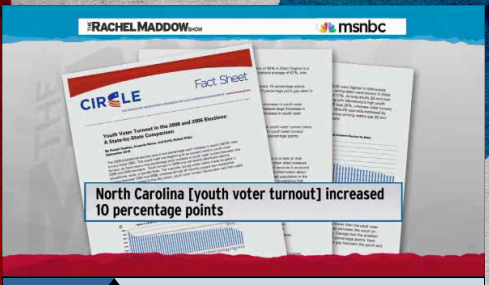- Facebook88
- Total 88
 Here is a CIRCLE Fact Sheet, as prominently displayed on Rachel Maddow’s MSNBC show (April 4). She is reporting on pending bills in North Carolina that would require the parents of students enrolled in the state to pay a state tax if their children opt to vote in their college town instead of at home.
Here is a CIRCLE Fact Sheet, as prominently displayed on Rachel Maddow’s MSNBC show (April 4). She is reporting on pending bills in North Carolina that would require the parents of students enrolled in the state to pay a state tax if their children opt to vote in their college town instead of at home.
Specifically, North Carolina residents would lose the dependency deduction of up to $2,500 per dependent if the child chose to register at her college address. I am sure the sponsors would argue–and perhaps believe–that the bill is fair because a student who chooses to vote away from home is not a dependent. I have argued that the decision about where to vote is indeed a weighty one; students should not simply choose the address where their vote will count more. Deciding to register in a given place is an expression of citizenship there that comes with responsibilities.
However, from a legal perspective, the Supreme Court has found that students have a right to register at college.* Choosing to register at college can be the most civic decision and does not imply that one is financially independent.
Considering that Mitt Romney won North Carolina by two points, but lost the 18-24 vote in the state by more than two-to-one (67%-31%), it is worth asking why the Republican legislature would raise taxes on these young people’s parents. Maddow simply describes the bill as a “tax hike” intended to “curb the college vote in North Carolina, to lower college turnout.” This legislation bears the Orwellian title of “Equalize Voter Rights.”
*See Symm v. U.S – 439 U.S. 1105 (1979), but the majority summarily affirmed a Texas District Court decision, so the Supreme Court provided no legal or theoretical basis for the conclusion that voting in one’s college town is a constitutional right.